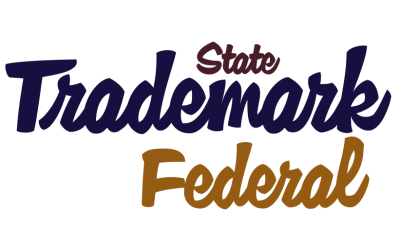 Now that you determined that you need to seek a trademark registration. The next question is what type of registration should you seek: a registration from your state or registration from the federal government? The answer is the federal government in most cases and here’s why.
Now that you determined that you need to seek a trademark registration. The next question is what type of registration should you seek: a registration from your state or registration from the federal government? The answer is the federal government in most cases and here’s why.
Costs
State trademark registrations cost less. The government fees for state registration depend on the state but tend to be less than a federal registration. For example, an Illinois state trademark application has a $10 registration fee. Whereas a federal trademark application at the United States Patent & Trademark Office has a fee in the range of $275 to $325 per class of goods/services declared in the application.
Geographic scope
The scope of protection provided by state trademark registration depends on the state, but does not extend outside of the boundaries of the state. In contrast, a federal registration provides protection throughout the entire nation. So, while state trademark applications cost less you also get less protection.
Conflict with Federally Registered Marks
One problem with relying on a state trademark registration is that the U.S. Patent and Trademark Office (USPTO) will not check state trademark databases when reviewing applications for a federal trademark registration. Therefore, your state trademark registration will not block a party from obtaining a federal trademark registration on a mark that is the same or similar to yours. If someone has obtained a federal registration before you file and obtain a state registration, their federal registration will trump your state registration. Even if you obtain your state registration before a third party obtains a federal registration, your rights may be limited by the existence of the federal registration. The bottom line is that a state registration will not provide much benefit in the case of a conflict with a federal application or registration.
Problems with State Trademarks: the case of Burger King v. Hoots
The case of Burger King of Florida Inc. v. Hoots, 403 F. 2d 904 (7th Cir. 1968), shows how a state trademark registration will not hold up against a federal trademark registration, even if the state registrant is the first to use the mark within the state. In that case, Burger King (the well-known chain) sued Gene and Betty Hoots for operating a restaurant in Mattoon, IL under the name Burger King.
Hoots started their Burger King restaurant in Mattoon in 1957 and in 1959 they received a state trademark registration from Illinois, without knowledge of plaintiff Burger Kings’ prior use of the same mark. The plaintiff Burger King started in Florida in 1953 and was operating 29 stores in multiple states by 1957. The plaintiff Burger King filed a federal trademark application in September 1958 and received its federal registration over the Burger King mark in 1961. In the same year Burger King opened a restaurant in Skokie Illinois and had knowledge of the Hoots Illinois trademark registration at the time. Burger king continued opening restaurants and had 50 Burger King restaurants in Illinois in 1967.
Basically Hoots was the first to use the Burger King mark in Illinois and was first to register the mark in the State of Illinois.
The court found that the Hoots’ rights to use the Burger King mark were limited to the common law right in the geographic market area about their operation in Mattoon (20 mile radius around the Mattoon location). The court found that federal trademark law trumped state trademark law and the state law could not expand Hoots common law rights. The state registration did not give Hoots the right to operate anywhere in Illinois because that was beyond the area where the Hoots actually used the mark.
Even though Hoots was first to use the mark in Illinois, their state trademark registration was essentially worthless against a federal trademark that was obtained after they started using the Burger King mark in Illinois. This case shows the weakness of state trademark registrations.
Local Businesses and the Internet
If your business is strictly local, you might be considering a state trademark registration. One such example of a strictly local business might be if you have a restaurant and you have no plans to create a chain of restaurants that extended outside of your state. Before the rise of the Internet, the approach of seeking only state trademark protection on strictly local business had more merit (however it still had the risks of conflict with Federal marks listed above).
But now virtually every business has a website that is accessible from anywhere in the world. Therefore if you have a strictly local business and people are searching for your business on the Internet, it’s possible that your business name or trademark will conflict with another business located in a different locale. In other words, the presence and searching on the Internet creates the possibility that strictly local businesses will run into trademark conflicts online that they wouldn’t otherwise encounter. Some search engines attempt to provide search results based on the searcher’s location, however relying on the search engine algorithms to protect your brand is not recommended.
Border issues
Businesses located near the border of their state can also run into problems. State trademark rights do not extend beyond the boundaries of the state. So, if your business is located close to the boundary of your state and another business starts up across the boundary in another state, but close by, your state trademark registration will not be effective to stop them.
Conclusion
State trademark registrations are generally inexpensive but provide few benefits. Therefore if you’re interested in protecting your brand you should consider filing a federal trademark application if your circumstances allow.